Juneteenth
Racist cops, statues under siege
On Juneteenth — June 19, 1865 — also known as Freedom Day, enslaved Black people in Galveston, Texas, were told they were finally freed. Abraham Lincoln’s signing of the Emancipation Proclamation on Sept. 22, 1862, declaring that all enslaved people in the Confederate states would be forever free, took over two and a half years to affect them.
Juneteenth has been celebrated by African Americans for 154 years. While corporate U.S. history focuses on Lincoln and the Union Army freeing the people enslaved by the Confederacy, W.E.B. Du Bois argued that around 500,000 Black people freed themselves from slavery by walking off plantations. Many joined the Union Army and helped the Union win the war. Their withdrawal of labor from the plantations was a devastating blow to the South’s economy.
For many Black communities, Juneteenth rather than July Fourth is considered their true independence day. Now Juneteenth 2020 will go down in history as a turning point as many municipalities declared it an official holiday. Fueled by weeks of protests against systemic racism, thousands turned out in cities large and small to celebrate and demand recognition of Juneteenth as a national holiday marking the end of slavery in the U.S.
Trump’s racist rally fizzles
Donald Trump’s efforts to use Juneteenth to galvanize his racist, right-wing supporters at his first major campaign rally in 2020 — in, of all places, Tulsa, Okla. — fizzled by all accounts. Public outcry forced him to change the rally date to June 20. Turnout was far from the 1 million he bragged were registered to attend.
Two-thirds of the 19,000-seat BOK Center remained empty. Six staff members turned up COVID-19 positive. Yet that didn’t stop Trump from delivering a racist speech that downplayed COVID-19, blamed protesters for the low turnout, defended Confederate statues and threatened legitimate Black Lives Matter protesters with state repression.
Meanwhile anti-racism and anti-police brutality protests continue unabated around the globe. The following are reports from just a few that took place in the days surrounding June 19.
Manhattan, New York
Several hundred demonstrators gathered around City Hall in downtown Manhattan for the Juneteenth remembrance called by the December 12th movement on June 19. However, the tone of the demonstration was one of defiance rather than celebration. Organizers marched from City Hall to Wall Street to make the connection between the violence of the police and the capitalist ruling class they protect.
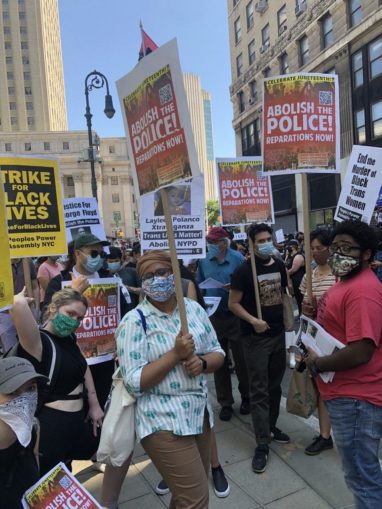
Manhattan
Within hours numbers swelled to over a thousand, with many different political tendencies attending. As has become common, there was interference from liberal reformers. This time, it was representatives from the Office of the Mayor who approached organizers and tried to lead the march. However, the liberal presence was drowned out by more radical groups.
In the evening, the demonstration converged with several others in Washington Square Park. The energy level of the crowd was high and the police decided to keep their distance. Before the demonstration ended, protesters knelt for 8 minutes and 46 seconds, the amount of time the police officer knelt on the neck of George Floyd when he was murdered.
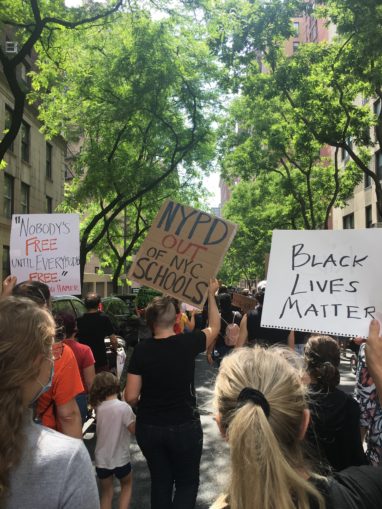
New York City children’s march.
Brooklyn, N.Y.
Over 15,000 people took to the streets on June 14, as part of the Brooklyn Liberation March for Black Trans Lives. In a true show of Black Trans power, the event was organized in a week’s time by The Okra Project, Marsha P. Johnson Institute, For The Gworls, Black Femmes in the Arts and G.L.I.T.S. ( Gays and Lesbians Living In a Transgender Society).
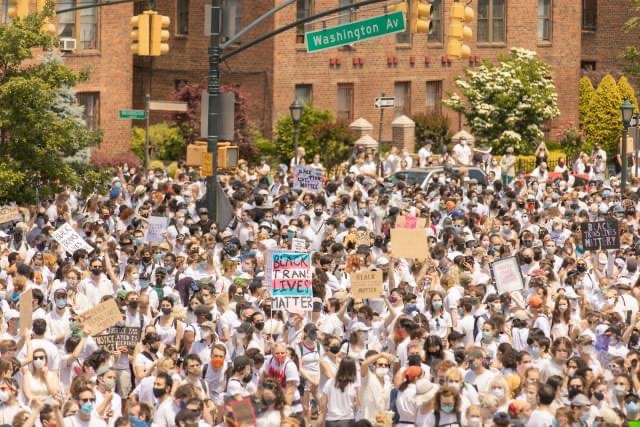
Brooklyn
After a transformatively loving rally, the sea of people, clad in white, walked from Grand Army Plaza to Fort Greene Park. The silent march was designed to make a safer space for Black Trans people and give a nod to the NAACP’s 10,000-person Silent Protest Parade for Black Lives down Fifth Avenue in 1917.
The Brooklyn event was a massive, Black Trans-led, socially distant march with a physically accessible route. It was an outpouring of love for Black Trans people — the real beginning of Pride 2020.
Queer people know there would be no Pride without Black people. Reclaim Pride is back in New York City this year with their second annual march on June 28 — the Queer Liberation March for Black Lives and Against Police Brutality.
After weeks of rebellion all over the world, conservative media outlets have tried to force the narrative that this season of protest is drawing to a close. But these massive organizing efforts are proof of the opposite. The movement is gaining momentum. And if we center Black Trans lives in our struggle for collective liberation, we will win!
Buffalo, N.Y.
People’s Pride: Solidarity In The Spirit Of Stonewall, held June 21, was created to express solidarity with the Movement for Black Lives going on here and around the world. The speakers addressed the history of Buffalo’s own Conde Peoples III who helped strike down sodomy laws in New York. Other speakers included two Black poets who discussed white appropriation of the Black Lives Matter movement, racism and cultural appropriation. The final speaker spoke about living as a Black disabled queer person and the effects of racism.
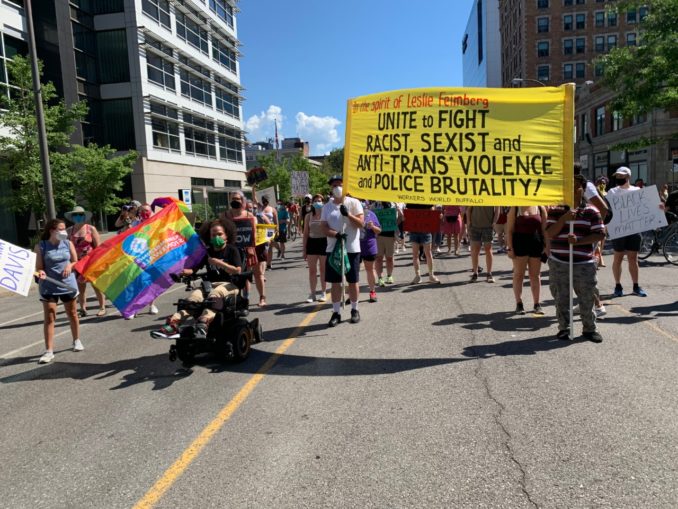
Buffalo, N.Y.
Philadelphia
Multiple events took place in Philadelphia on June 19. Demonstrators gathered at the African American Museum, marched through Center City chanting, “Black Lives Matter! Black Lives Matter!” At City Hall they merged with another group of demonstrators who were blocking traffic. The demonstrators ended with a protest against police violence in front of the Philadelphia Museum of Art. City offices were closed in honor of Juneteenth, as were several businesses.
The Philadelphia chapter of Black Lives Matter and We Want Freedom for Black Philly celebrated with an event called Jawnteenth at Malcolm X Park in West Philadelphia. Several hundred people marched from the park down 52nd Street as motorists honked in support. Residents along the street, where police had violently attacked demonstrators with tear gas and rubber bullets on May 31, stood on porches with fists in the air.
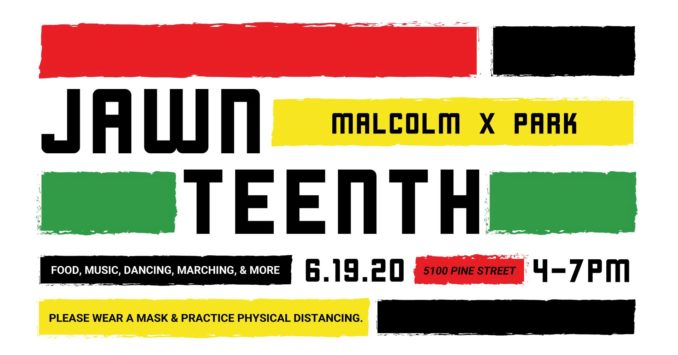
Muda Bey, with the Revolutionary Black Panther Party of Philadelphia, called Juneteenth the true independence day for people of African descent: “A lot of people don’t understand that July Fourth for them and July Fourth for us looked totally different. So this is our true Independence Day, and I encourage every Black person and every person in the African diaspora to celebrate Juneteenth because this was when you were rightfully free. (Inquirer.com, June 20)
Former prisoner Robert Saleem Holbrook, with the Human Rights Coalition and Abolitionist Law Center, called for releasing political prisoners including Mumia Abu-Jamal: “We need to start lifting up restorative justice, but more importantly, we need to bring our political prisoners home.”
Raleigh, N.C.
Juneteenth in Raleigh, the capital of North Carolina, began in a somber mood. The previous evening, Raleigh police had engaged in an extremely high-profile arrest of two organizers from NC BORN (Building Our Revolution Now) — both Black women. NC BORN has hosted daily actions for three weeks, protesting police, prisons and the carceral system in general. (bit.ly/3djFlRd)
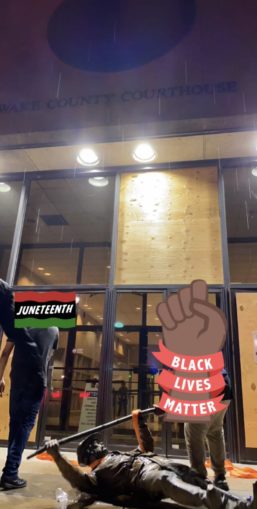
Raleigh, N.C.
With big plans for Juneteenth, NC BORN and the Raleigh Demands Justice Coalition (raleighpact.org/pledge) began gathering in the streets at 11 a.m.
By 2 p.m., the chief of police called a press conference — at the city’s whitest precinct, about 10 miles from the arrest and protest site — where he dropped all charges against NC BORN organizers and opened investigations into the officers responsible. Members of the City Council began to openly call for defunding the police.
The people were empowered. The oppressors were afraid. The movement celebrated with a block party, with Black Raleigh joining protesters on horseback, a community meal from Food Not Bombs, artistic and cultural celebrations — and before long, a march to the Capitol.
Numbers soon swelled into the hundreds until protesters finally began scaling the 75-foot memorial to enslavers on Capitol grounds and affixing ropes to two statues. A series of clashes followed, first between protesters and police, then between a business-aligned group and Black socialist organizations, over access to the statue. Police from the State Capitol, Raleigh, Wake County and even the State Highway Patrol were called to defend the monument until at last the police exhausted their reinforcements and were forced off the monument after about an hour of struggle.
The Confederate statues were eventually pulled from atop their pedestals and dragged through the streets of a city now emptied of law enforcement. The two monuments were strategically left in Raleigh — one suspended from a traffic light and the other on the steps of the courthouse, as Wake County cops, in comical levels of military gear, cowered inside the building.
The crowd dispersed safely and returned to the streets the next day when they witnessed a crew removing the remains of the white supremacist monuments from the capitol grounds.
Decatur, Ga.
After almost three years of struggle, the “Lost Cause” Confederate monument in front of the DeKalb County Courthouse was taken down on June 18. Erected in 1908 — the year the Georgia Legislature passed a constitutional amendment denying Black voting rights — the statue has symbolized white supremacy for 112 years. Community groups Beacon Hills Black Alliance for Human Rights and Hate Free Decatur led the campaign that forced the removal on the eve of Juneteenth. Hundreds gathered in the square, cheering as it was disassembled and hauled away on trucks.
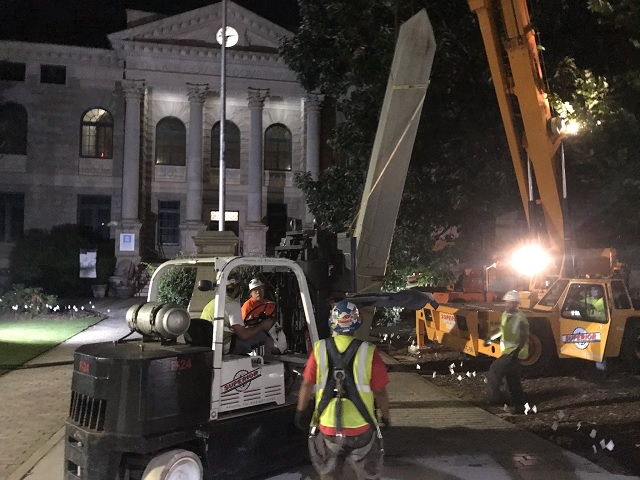
Decatur, Ga.
San Antonio, Texas
Three days of Juneteenth actions in San Antonio brought anti-racist activists into the streets again. There were two marches on June 19 and one on June 20. On June 21, a caravan of over 80 cars wove through the city honking and displaying Black Lives Matter placards.
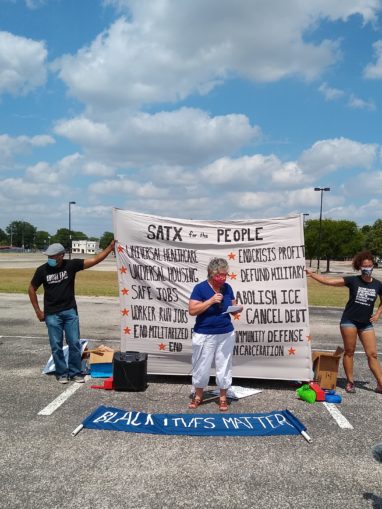
San Antonio, Texas
Makasi Motema, Sawyer Eason, Ezra Echo, calvin deutschbein, Dianne Mathiowetz and Shelley Ettinger contributed to this article.

